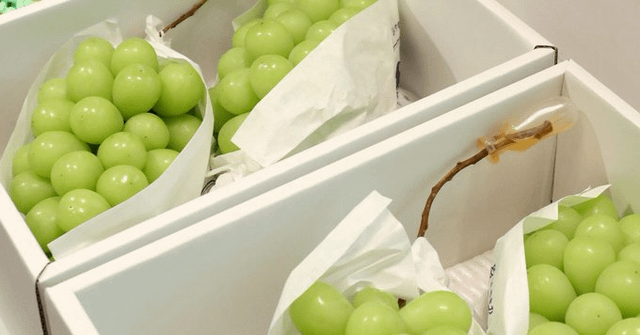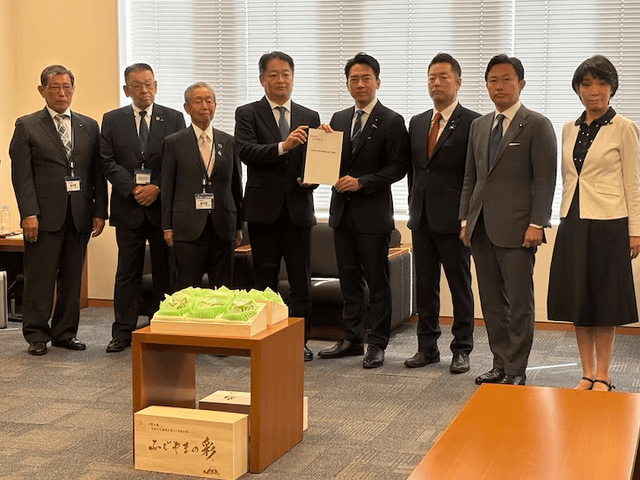

https://jp.reuters.com/markets/commodities/A3L2SAAGXVLHBMTL6KBUMK4PAY-2025-09-25/?taid=68d4fcbd7de7d80001c677aa&utm_campaign=trueAnthem:+New+Content+(Feed)&utm_medium=trueAnthem&utm_source=twitter&utm_medium=trueAnthem&utm_source=twitter)
There has been an uproar on social media, accusing Koizumi, current MAFF minister (Ministry of Agriculture, Forestry and Fisheries) of selling off Japan's precious fruits overseas. But here's an agricultural expert who clearly explains the situation.
Name: Yoshihiro Asakawa
https://x.com/yoshiasakawa/status/1971215930563948953
(1)
In the case of Shine Muscat, licensing agreements have been made with "legal" farmers in countries such as New Zealand, who have different harvest seasons, and by taking advantage of the differences in harvest seasons, they are able to collaborate and export to the world year-round. By increasing the number of licensees outside of New Zealand and having "legal" Shine Muscat farmers around the world join forces, this is also a mechanism to keep pirated goods from "illegal" farmers in China and elsewhere out of the market.
(2)
For example, Zespri's "legal" kiwi fruit can be eaten all year round thanks to a licensed connection between New Zealand farmers and contracted Japanese farmers (in Kyushu, Shikoku, Yamaguchi, Mie, etc.). Similar contracts are also in place with Italian, French, Greek, American, and Chilean farmers. If a Shine Muscat version using the same system as Zespri could be produced, it could be exported worldwide.
(3)
Like Shine Muscat, even though a large amount of pirated Zespri products are produced in China, they have been successfully prevented from entering the Japanese market. This is because, thanks to collaboration between New Zealand and Japanese producers, genuine Zespri products fill the shelves all year round. However, if the shelves become empty, "unfair" supermarkets may stock them with pirated Chinese products.
(4)
In a previous example of licensing a Japanese variety, Nagano Prefecture's apple variety, Shinano Gold, was first licensed in Italy in the Northern Hemisphere, and then contracts were signed with producers' associations in New Zealand, Australia, South Africa, and Chile in the Southern Hemisphere. Currently, it is exported to nearly 100 countries. However, no "illegal" Shinano Gold apples have been imported into Japan. This is proof that farmers in the contracted countries are following the rules.
(5)
Naturally, Nagano Prefecture, which developed the Shinano Gold apple variety, receives licensing fees from apple-producing regions around the world. This revenue will be used to develop new varieties in Nagano Prefecture, creating a virtuous cycle without relying solely on taxes. By spreading the variety around the world, the needs of producers and consumers in each region can be grasped, and a market will be created where Japanese breeders and farmers can meet those needs.
(6)
Excellent Japanese breeders, growers, and agricultural engineers will have a wider range of opportunities to work around the world as evangelists for new varieties. They will play a part in promoting new varieties, be respected, and be properly compensated. However, there are cases like China and Korea, where people have gone to teach but failed to follow the rules, and their varieties have been stolen, resulting in repayment of kindness. This is not the only example of the spread of new agricultural varieties in the world.
(7)
The key is to respect the rights of varieties and conclude contracts with farmers and producer associations in countries and regions that abide by the rules. Trusted breeders and farmers can become long-term partners, not just in Japan but overseas. It's all about knowing better than anyone that superior varieties help farmers thrive, and that protecting and spreading them will ensure that farming can continue for generations.
(8)
Furthermore, fruit farmers in these countries and regions have had the bitter experience of having their varieties stolen by illegal farmers who do not follow the rules, such as those in China, and losing their markets to these pirated agricultural products, even more so than in Japan. Therefore, even though they are from different countries, reliable farmers and producing areas constantly cooperate with each other to monitor illegal farmers and pirated products, and have a long history and know-how of fighting them.
(9)
Japanese varieties are copied not only from China and Korea but from anywhere else overseas, so if we continue to maintain a closed-door mentality and never let them leave the country, we will always be defeated. Instead, if we proactively team up with reliable producers in Europe, the US, and South America, which have a long history of winning variety battles against China and other countries, Japanese farmers will be able to acquire for the first time the fighting ability and know-how to defeat illegal farmers around the world.
(10)
On the other hand, the article also mentions Yamanashi Prefecture's position that "plant quarantine and other issues are barriers that are preventing the export of domestic Shine Muscat grapes from progressing at all," "the governor emphasized to Mr. Koizumi that if exports are not possible, they will not be able to compete on an equal footing," and "they must put in place a system for exports before granting a license to New Zealand," but the argument is not clear.
(11)
Furthermore, Yamanashi Prefectural Government has even written in its official statement that it "cannot tolerate" the licensing of the product to New Zealand, but the breeding rights holder is the National Agriculture and Food Research Organization (NARO), which is under the jurisdiction of the Ministry of Agriculture, Forestry and Fisheries, not Yamanashi Prefecture. Given that they have no authority to stop the licensing, what is the reason for the protest? When we asked a prefectural government official, they said, "It's just a matter of timing, and we're not opposed to the licensing itself."
Here's an awesome Q/A format posts by the expert himself:
https://x.com/yoshiasakawa/status/1971464111230943693
It clears up the current doubts about the system.
It seems that the current outrage stems from misunderstanding and the lack of knowledge about how licensing works. Regarding Yamanashi Governor's protest, it seems to be more politically motivated rather than an actual issue. When repeatedly asked, the governor's office said, "We are not opposed to the licensing itself. Its just bad timing". When asked, "What is the suitable time then?". They couldn't answer it. They just said, "The timing is bad".
It seems the current governor can't give a proper justification for opposing the licensing which is meant to prevent illegal farmers in China and South Korea from entering the market.
by YamatoRyu2006
